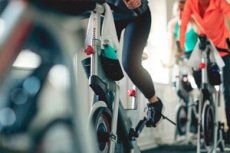
英国伯明翰大学和巴斯大学的研究人员开展的一项新研究发现,剧烈运动或可提高利妥昔单抗疗法的疗效。利妥昔单抗是一种常用于治疗慢性淋巴细胞白血病 (CLL) 的抗体。该研究结果发表在《大脑、行为与免疫》杂志上。
研究描述
这项研究涉及20名患有慢性淋巴细胞白血病且此前未接受过任何癌症治疗的患者。作为研究的一部分,参与者以中等至高强度的骑行方式进行20至30分钟的训练。
主要发现
研究人员发现,这类运动使抗癌免疫细胞(即自然杀伤细胞)的数量增加了254%。当与利妥昔单抗(一种与癌细胞上的蛋白质结合,帮助自然杀伤细胞识别并摧毁癌细胞的药物)结合时,在运动后立即采集的血液样本中,抗癌细胞的效力提高了一倍。
作者写道:“这项研究首次表明,一次高强度的自行车训练可以提高利妥昔单抗介导的针对自体慢性淋巴细胞白血病细胞的 ADCC [抗体依赖性细胞毒性]。”
专家意见
纽约大学朗格尼健康中心珀尔马特癌症中心临床淋巴瘤项目主任凯瑟琳·S·迪芬巴赫博士没有参与这项研究,她表示,研究结果很有趣,但由于样本量较小,仍然存在疑问。
她解释说:“这是一项在受控环境下对 20 名患者进行的小型试点研究,患者仅进行规定形式的有限锻炼,结果发现了有关 NK 细胞活化和利妥昔单抗诱导的慢性淋巴细胞白血病 (CLL) 细胞杀灭的有趣生物学发现。”
“然而,这些数据需要在更大规模、更异质性患者群体中进行验证,”迪芬巴赫提醒道。“目前还不清楚这一发现如何影响临床结果,或者是否对治疗反应或疾病稳定性有任何影响。”
加利福尼亚州奥兰治县纪念护理癌症中心的认证血液学家和肿瘤学家 Wael Harb 博士也指出,很难从这项研究中得出广泛的结论。
“能够进行剧烈运动的患者与不能进行剧烈运动的患者相比,免疫力可能有所不同。考虑到运动能力和样本量,我们如何将这些发现推广到其他人?”哈布博士问道,并补充说,由于这项研究依赖于离体血液样本,因此很难确定体内发生了什么。
“最重要的是,它如何影响治疗结果,对吧?我们需要长期观察才能知道,它是否真的会影响治疗反应,以及白血病的缓解?我们需要进行更结构化的研究,找出答案,并将患者随机分配到使用相同疗法(利妥昔单抗)的不同方案或含利妥昔单抗的疗法,并在此基础上添加不同的运动计划,”他补充道。
运动对癌症的影响
尽管许多癌症治疗,尤其是化疗或手术,会导致严重疲劳,从而阻碍身体活动,但越来越多的证据表明运动可以刺激免疫细胞。
哈布博士解释说,有充分的证据表明,体育锻炼可以增强人体免疫系统,对抗癌细胞。他引用了近年来几项研究,这些研究探讨了短期剧烈运动和更规律的活动模式的效果。
他在谈到医生的建议时说:“我们建议积极锻炼——我们相信有大量证据表明,在癌症治疗期间锻炼有助于免疫系统,而且现在我们比以往任何时候都更了解免疫系统在抗击癌症中的作用。”
“事实上,许多新的癌症治疗方法都是基于免疫疗法,这有助于激活免疫系统来对抗癌症,”哈布补充道,但他也对运动作为癌症治疗的辅助手段提出了警告。
“强化训练稍微困难一些。这取决于个人的运动能力、年龄以及任何可能增加训练难度的潜在疾病。因此,当我们谈论强化训练时,可能会出现一些实际问题;它会限制患者的参与度。”他指出。

